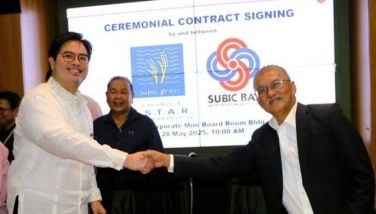Proof of progress

The concept of “Public-Private-Partnership” has started to bear fruit, and San Miguel Corporation has the project to prove it.
For the last seven months San Miguel Corporation has quietly fast tracked the construction of a fully modernized passenger terminal at the Boracay-Caticlan airport, which has transformed the terminal from an antiquated, manually operated facility, into an expanded terminal complete with all modern day requirements.
The upgrade consists of 2 modern X-ray machines, metal detector, baggage carousel, dedicated check-in counters, fully air-conditioned waiting areas and a VIP mezzanine, with all areas provided with flat-screen video monitors.
Even security into the airport area has been upgraded as well as baggage handling from aircraft to terminal.
Last Saturday, June 25, no less than President Noynoy Aquino graced the presentation and opening of the “initial phase” of the project. Although the President had to brave stormy weather and the stress of such a round trip flight and a short stay, he was clearly happy and appreciative of how much had been accomplished in a short seven months.
Half way through the opening ceremonies, the President was given a PowerPoint presentation of the full-scale of the development. From its current length and width, the Boracay-Caticlan Airport runway would be doubled thereby allowing the entry of much larger commercial aircrafts.
Aside from physical expansion, the runway would also be upgraded and fully illuminated thereby making it operational for nighttime flights. As a direct consequence, airport authorities are confident that this would immediately increase passenger influx by as much as 30 percent more.
In terms of foreign tourists, the upgrade would allow visitors from the region to fly directly to Boracay-Caticlan Airport instead of the added cost of stopping over in Manila or Cebu, hotel accommodations and lost time due to transfers. This in turn will allow tourists to stay longer and have more disposable income for the local economy of Boracay and Caticlan.
For local passengers, the entry of larger planes is expected to lead to lower airfares and the option of flying in cargo and supplies instead of sending them by boat particularly if these are highly perishable goods needed by hotels, resorts and kitchens on Boracay Island.
With all these new inputs, the developers are quick to point out that the “new” terminal will grow even bigger because what we see today was constructed to address the current volume and demands on the terminal. In the succeeding months, further expansion will continue in expectation of the 30 percent growth from nighttime flights as well as the entry of larger aircrafts.
From Airport development we also learned that the project will eventually spread out to include the construction of a mixed-use complex that will showcase hotels for both local and foreign tourists who need or choose to stay in Caticlan. Alongside the hotels, there is a plan to construct a major mall as well as an international standard jetty where cruise ships can dock.
Having just recently done a road trip from Manila to Boracay, I can personally attest to the need for cruise ships, docking areas and especially a selection of quality hotels in Caticlan. If local executives of Batangas, particularly Congressman Dong Mendoza succeeds with their plans, they hope to set-up such a service between San Juan, Batangas and Caticlan-Boracay.
At the moment the port facilities cater to ROROs but not to Super Ferry or Cruise ships. Passengers have to lug their baggage and belongings and are off loaded in a pier that is not really tourist or traveller friendly.
In his speech, President Noynoy praised SMC President Ramon Ang and his platoon of hardworking people at SMC and TRANSAIRE Corporation, while reiterating his belief that the Public-Private-Partnership program alongside Tourism is one of the fastest ways for Filipinos to experience the much awaited changes and progress outside of Metro Manila.
* * *
While PNoy is working at speeding up his PPP projects, the President should also send an inspection team to the NAIA Terminal 3 to assess some of the observations made by 12 Business Journalists who were stranded at the NAIA thanks to Cebu Pacific who I believe are actually cargo forwarders pretending to be an airline.
I’ll save a special column for that company later this week but in the mean time, Malacanang should ask their NAIA manager what they are doing to make terminal 3 as customer friendly as NAIA 2?
For starters, why are there no seating areas or chairs for passengers outside the boarding areas? At the moment passengers are forced to buy food from concessionaires, squat in coffee shops just to be able to sit or access a WIFI source.
Passengers who are full or have no need to buy food are forced by circumstance to do so just to get a seat, while business establishments lose income opportunities because passengers “squat” where customers could be sitting down.
Last Friday 12 Business Journalists, including a Bloomberg Correspondent had to take turns to sit under a phone booth to plug their laptops or charge their cell phones because there were only 2 visible and accessible power outlets at Terminal 3.
In comparison, Terminal 2 under PAL management provides 2 if not 3 work areas where passengers can plug in their laptops and connect to the Internet for free! Those who need to charge mobile phones, IPods and the like have access to a service either for free or at a small costs.
The most embarrassing thing we noted last Friday was the many times, airline personnel went around terminal 3 shouting out for passengers the same way Jeepney barkers called out the destination or routes of Jeepneys.
Where does all the money collected for airport tax go? MIAA should at least invest on decent public address systems or instruct airline personnel to copy the more discreet example of hotels who use a bell and a name board! It’s an airport not a Jeepney stop.
* * *
- Latest
- Trending





























